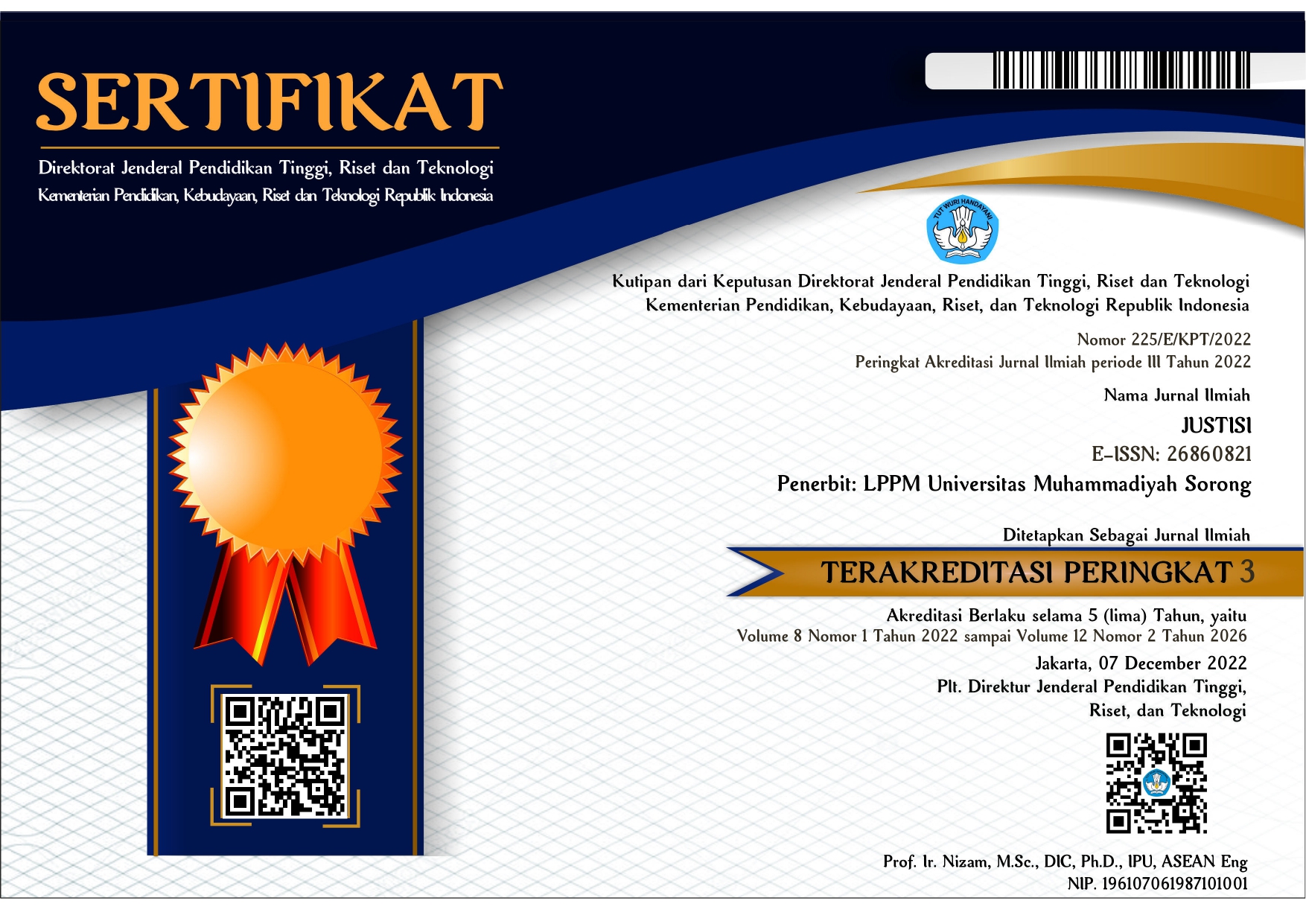Defense Exceed the Limits (Noodweer Exces) in Victim Repositioning Principle
DOI:
https://doi.org/10.33506/js.v10i3.3287Keywords:
Legal Consequences, Victim, NoodweerAbstract
The victim who is in the position of being the perpetrator of defense exceed the limit due to the act of murder committed against the perpetrator of begal in criminal law regulated in Article 49 Paragraph (2), which is known as Noodweer Exces. This study aims to identify situations where defense exceed the limit in the context of the victim's role reversal in the case of the crime of robbery. The study applied normative legal research as the method. The approach involves analyzing and describing legal materials such as relevant literature, journals, and regulations, focusing on interrelated primary and secondary legal sources. The main difference with previous study is the emphasis on statutory analysis and case approach, as well as the application of the theory of criminal elimination, the theory of negative proof, and the principle of culpa in causa as supporting theoretical foundations. The findings show that, in principle, criminal regulations in Indonesia protect from a legal perspective against acts of defense carried out by individuals, in this case involved as victims of a criminal offense. Therefore, acts of defense exceed the limits are considered not criminalizable because defense is a right owned by everyone to fight against actions contrary to legal provisions. A person is considered in forced defense if they meet the conditions stipulated in Article 49 Paragraph (2) of the criminal law. These conditions include the act of defense that exceeds the established limits, the direct effect of severe mental or mental shock due to the attack that occurred at that time, and the act of defense in response to the attack or threat of attack. However, the granting abolition of punishment also depends on the results of the trial evidence in this case, which determines whether the perpetrator entitled to obtain it or not.References
Affiani, Rifrinda Nur, and Suyatna. “Pertimbangan Hakim Dalam Menentukan Kematian Korban Dalam Tindak Pidana Pembunuhan (Studi Kasus Putusan Nomor: 26/Pid.B/2014/Pn.Atb).” Indonesian Journal of Law and Justice 1, no. 3 (2024): 8. https://doi.org/10.47134/ijlj.v1i3.2070.
Akbar, Muhammad Fatahillah. “The Urgency of Law Reforms on Economic Crimes in Indonesia.” Cogent Social Sciences 9, no. 1 (2023): 2175487. https://doi.org/10.1080/23311886.2023.2175487.
Alfitra, Alfitra, Afwan Faizin, Ali Mansur, and Muhammad Harfin Zuhdi. “Decency Norms in Law Enforcement to Online Prostitution in Indonesia: An Islamic Law Perspective.” Al-Istinbath: Jurnal Hukum Islam 8, no. 1 May (2023): 194–214. https://doi.org/10.29240/jhi.v8i1.7044.
Ali, Tengku Mabar. “Kepastian Hukum Penghentian Penyidikan Oleh Pelaku Tindak Pidana Pembunuhan Yang Didasari Pada Tindakan Pembelaan Terpaksa Yang Melampaui Batas (Noodweer Excees).” Jurnal Ilmiah METADATA 5, no. 2 (2023): 176–82. https://doi.org/10.47652/metadata.v5i2.377.
Anak Agung Gede Agung., Anak Agung Sagung Laksmi Dewi., and I Made Minggu Widyantara. “Perlindungan Hukum Terhadap Pelaku Pembunuhan Begal Atas Dasar Pembelaan Terpaksa.” Jurnal Interpretasi Hukum 2, no. 1 (2021): 1–7. https://doi.org/10.22225/juinhum.2.1.3075.1-7.
Anjani, Isabella Merlin, and Ade Adhari. “Tinjauan Yuridis Pembelaan Terpaksa (Noodweer Excess) Sebagai Dasar Penghapusan Pidana Analisis Kasus Pelaku Begal Di NTB Yang Terbunuh Oleh Korban Begal AS.” Unes Law Review 5, no. 4 (2023): 3471–85. https://doi.org/10.31933/unesrev.v5i4.685.
Bahri, Saiful. “Problema Dan Solusi Peradilan Pidana Yang Berkeadilan Dalam Perkara Pembelaan Terpaksa.” Jurnal Wawasan Yuridika 5, no. 1 (2021): 131. https://doi.org/10.25072/jwy.v5i1.415.
Berg, Mark T., and Christopher J. Schreck. “The Meaning of the Victim-Offender Overlap for Criminological Theory and Crime Prevention Policy.” Annual Review of Criminology 5 (2021): 277–97. https://doi.org/10.1146/annurev-criminol-030920-120724.
C.D.M., I Gusti Ayu Devi Laksmi, Ni Putu Rai Yuliartini, and Dewa Gede Sudika Mangku. “Penjatuhan Sanksi Terhadap Pelaku Tindak Pidana Pembunuhan (Studi Kasus Di Pengadilan Negeri Singaraja Dalam Perkara No. 124/PID.B/2019/PN. SGR).” Jurnal Komunitas Yustisia Universitas Pendidikan Ganesha 3, no. 1 (2020): 48–58.
Flora, Maria. “4 Fakta Korban Begal Jadi Tersangka Di Lombok NTT.” Liputan 6, 2022.
Gumelar, Ilham, and Gunawan Nachrawi. “Perlindungan Hukum Bagi Anggota Tni Berdasarkan Undang-Undang Hak Asasi Manusia (Studi Kasus Gerakan Separatis Organisasi Papua Merdeka).” JISIP (Jurnal Ilmu Sosial Dan Pendidikan) 6, no. 2 (2022): 4146–66. https://doi.org/10.58258/jisip.v6i2.3110.
Huda, Mohammad Nurul. “Korban Dalam Perspektif Viktimologi.” VOICE JUSTISIA : Jurnal Hukum Dan Keadilan 6, no. 1 (2022): 63–69.
Ishaq, H. Metode Penelitian Hukum Dan Penulisan Skripsi, Tesis, Serta Disertasi. Bandung: Alfabeta, 2020.
Kurniawan, I Gede Agus. “Putusan Mahkamah Konstitusi Terhadap Undang-Undang Cipta Kerja Dalam Perspektif Filsafat Utilitarianisme.” Jurnal Usm Law Review 5, no. 1 (2022): 282. https://doi.org/10.26623/julr.v5i1.4941.
Malasai, Landi. “Asas Culva In Causa (Penyebab Kesalahan) Sebagai Pengecualian Terhadap Pembelaan Terpaksa Menurut Pasal 49 Ayat (1) KUHP.” Lex Crimen 08, no. 8 (2019): 78–82. https://ejournal.unsrat.ac.id/index.php/lexcrimen/article/view/26797.
Mozin, Nopiana. “Perlindungan Hukum Terhadap Hak-Hak Terdakwa Dalam Penyelesaian Perkara Pidana Di Gorontalo.” Multidisciplinary Indonesian Center Jurnal (MICJO) 1, no. 1 (2024): 555–65. https://doi.org/ttps://e-jurnal.jurnalcenter.com/index.php/micjo Email:
Naufal, Asraf. “Analisis Hukum Pembelaan Terpaksa Secara Berlebihan Pada Kasus Penembakan Laskar Front Pembela Islam Oleh Anggota Kepolisian.” UMPurwokerto Law Review 4, no. 1 (2023): 54–61. https://doi.org/10.30595/umplr.v4i1.14245.
Pambayun, Niwang, Purbo Raras, Bambang Sugiri, and Alfons Zakaria. “Pembelaan Terpaksa ( Noodweer ) Bukan Sebagai Dasar Penghentian Penyidikan.” RechtJIva 1, no. 1 (2024): 149–66. https://doi.org/10.24014/je.v5i1.22332.Ronald.
Refim, Fergio Rizkya, and Salman Daffa Nur Azizi. “Dasar Hukum Pembelaan Terpaksa ( Noodweer ) Dan Pembelaan Terpaksa Melampaui Batas ( Noodweeer Excess ).” Jurnal Fundamental Justice 4, no. 117 (2023): 141–56.
Refin, Fergio Rizkya, and Salman Daffa’Nur Azizi. “Dasar Hukum Pembelaan Terpaksa (Noodweer) Dan Pembelaan Terpaksa Melampaui Batas (Noodweer Exces).” Jurnal Fundamental Justice 4, no. 2 (2023): 141–56. https://doi.org/10.30812/fundamental.v4i2.3277.
Salsabila, Reyvita. “Dasar Pertimbangan Hakim Dalam Menjatuhkan Sanksi Pidana Terkait Pembelaan Terpaksa Dalam Perkara Penganiayaan Yang Menyebabkan Kematian.” Bandung Conference Series: Law Studies 3, no. 1 (2023): 449–53. https://doi.org/10.29313/bcsls.v3i1.5010.
Samudra, Irwandi, and Fachri Wahyudi. “Pandangan Hukum Pidana Terhadap Pembelaan Terpaksa Yang Melampaui Batas (Noodweer Exces).” Jurnal Wasatiyah 4, no. 2 (2023): 1–18. https://doi.org/www.staimaarifjambi.ac.id PANDANGAN.
Sanjaya, I Gede Windu Merta Sanjaya, I Nyoman Gede Sugiartha, and I Made Minggu Widyantara. “Pembelaan Terpaksa Melampaui Batas (Noodweer Exces) Dalam Tindak Pidana Pembunuhan Begal Sebagai Upaya Perlindungan Diri.” Jurnal Konstruksi Hukum 3, no. 2 (2022): 2746–5055. https://doi.org/10.22225/jkh.3.2.4847.406-413.
Sari, Ratna Kumala. “Perbandingan Kebijakan Formulasi Alasan Pengahapusan Pidana Dan Konrtibusinya Terhadap Pembaharuan Hukum Pidana Nasional.” Justicia Sains: Jurnal Ilmu Hukum 6, no. 2 (2022): 355–71. https://doi.org/10.24967/jcs.v6i2.1519.
Siburian, Henry Kristian, Eko Setyo Nugroho Nugroho, Sardjana Orba Manullang, and Baren Sipayung. “Comparative Analysis of Corruption Criminal Regulations Between the New Criminal Law and the Corruption Act.” Awang Long Law Review 5, no. 2 (2023): 535–44. https://doi.org/10.56301/awl.v5i2.753.
Sihotang, Porlen Hatorangan. “Penyelesaian Tindak Pidana Ringan Menurut Peraturan Kapolri Dalam Mewujudkan Restorative Justice (Studi Di Polresta Deli Serdang).” Iuris Studia: Jurnal Kajian Hukum 1, no. 6 (2020): 107–20. https://doi.org/10.55357/is.v1i2.37.
Sitorus, Nanang Tomi. “Perdamaian Sebagai Upaya Penghapusan Proses Pidana (Studi Kasus Putusan Mahkamah Agung Nomor 1600 K/Pid/2009).” Doktrina: Journal of Law 3, no. 2 (2020): 128–39. https://doi.org/10.31289/doktrina.v3i2.4025.
Tan, David. “Metode Penelitian Hukum: Mengupas Dan Mengulas Metodologi Dalam Menyelenggarakan Penelitian Hukum.” NUSANTARA: Jurnal Ilmu Pengetahuan Sosial 8, no. 8 (2021): 2463–78. https://doi.org/10.31604/jips.v8i8.2021.2463-2478.
Wahyu Hidayat. “Analisis Penerapan Pasal 49 Kuhp Pada Tindak Pidana Pembunuhan (Studi Putusan No;140/Pid.B/2011, Pengadilan Negeri Muara Enim).” Journal of International Multidisciplinary Research 2, no. 2 (2024): 418–29. https://doi.org/10.62504/6c4v3128.
Wahyudani, Zulham, Oyo S Mukhlas, and Atang Abdul Hakim. “Aspek Pidana Dalam Hukum Keluarga Dan Penyelesaiannya Pada Lembaga Hukum Di Indonesia.” Legalite: Jurnal Perundang Undangan Dan Hukum Pidana Islam 8, no. 1 (2023): 75–90. https://doi.org/10.32505/legalite.v8i1.6197.
Wibawa Putra, Made Fajar Ari, and A.A.A.Ngurah Tini Rusmini Gorda. “Effectiveness of KPAI’s Role in Legal Protection of Children as Victims of Bullying Crime.” Justisi 10, no. 2 (2024): 257–72. https://doi.org/10.33506/js.v10i2.2837.
Wulandari, Ni Gusti Agung Ayu Mas Tri, Ibrahim R, I Dewa Made Suartha, and Ida Bagus Surya Dharma Jaya. “Death Penalty Imposition for Rape against Minors.” Social Science Journal 13, no. 2 (2023). https://doi.org/resmilitaris.net.
Zaki, Muhammad, Tofik Y Chandra, and Hedwig Adianto Mau. “The Problem of Corruption Law Enforcement That Causes State Losses Since The Constitutional Court of The Republic of Indonesia Number 25/PUU-XIV/2016 Decision.” Policy, Law, Notary and Regulatory Issues (POLRI) 1, no. 3 (2022): 17–34. https://doi.org/10.55047/polri.v1i3.204.
Downloads
Published
How to Cite
Issue
Section
License
Copyright (c) 2024 I Gusti Ngurah Dwi Puspanegara, Ni Gusti Agung Ayu Mas Tri Wulandari, Luh Putu Yeyen Karista Putri

This work is licensed under a Creative Commons Attribution-ShareAlike 4.0 International License.









